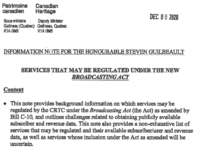The CRTC last week released the first two of what is likely to become at least a dozen decisions involving the Online Streaming Act (aka Bill C-11). The decision, which attracted considerable commentary over the weekend, involves mandatory registration rules for audio and visual services that include far more than the large streaming services. The Commission says the registrations would give it “de minimis information about online undertakings and their activities in Canada, which would give the Commission an initial understanding of the Canadian online broadcasting landscape and would allow it to communicate with online undertakings.” By contrast, the inclusion of registration requirements for a wide range of undertakings, including some podcast services, online news sites, adult content sites, and social media left some characterizing it as a podcast registry or part of “one of the world’s most repressive online censorship schemes.” So what’s the reality? As is often the case, it is not as bad as critics would suggest, but not nearly as benign as the CRTC would have you believe.
Post Tagged with: "internet regulation"
The Liberal Election Platform: Government Picks Internet Regulation Over Internet Affordability
The Liberal party released its election platform yesterday and perhaps everything you need to know can be gleaned from the fact that Canadian Heritage Minister Steven Guilbeault posted multiple tweets about plans for new cultural spending initiatives and Internet regulations in French without a single English language tweet. This is surely not a coincidence since the government’s digital policies have long been designed to curry favour in Quebec, even at risk of angering voters in the rest of Canada. Based on decision to forge ahead with Internet regulations with enormous implications for freedom of expression, alienating voters in the rest of Canada that have raised concerns with policies such as Bill C-10 is not a worry for the Liberal government.
Neither, it would seem, is the affordability of Internet and wireless services, which do not receive a single mention or direct policy measure. In doing so, the party has seemingly abandoned wireless competitiveness as an issue and unequivocally sided with the big telecom companies despite presiding over some of the world’s most expensive wireless services. The party platform is titled “Forward for Everyone” but not everyone moves forward in quite the same way with big telecom companies moving further ahead than Canadian consumers.
Not Just Big Tech: Government Memo Shows Bill C-10 Targets News Sites, Podcast and Workout Apps, Adult Websites, Audiobooks, and Sports Streamers for CRTC Regulation
Canadian Heritage Minister Steven Guilbeault has tried to deflect public concern with the regulation of user generated content under Bill C-10 by claiming the intent is to make the “web giants” pay their fair share. Yet according to an internal government memo to Guilbeault signed by former Heritage Deputy Minister Hélène Laurendeau released under the Access to Information Act, the department has for months envisioned a far broader regulatory reach. The memo identifies a wide range of targets, including podcast apps such as Stitcher and Pocket Casts, audiobook services such as Audible, home workout apps, adult websites, sports streaming services such as MLB.TV and DAZN, niche video services such as Britbox, and even news sites such as the BBC and CPAC.
The regulations would bring the full power of CRTC regulation over these sites and services. This includes requiring CRTC registration, disclosure of financial and viewership data, Canadian content discoverability requirements (yes, that could mean Canadian discoverability for pornography services), and mandated payments to support Canadian film, television, and music production. The list also notably identifies potential regulation of Youtube Music, Snapchat Originals, and other social media services whose supposed exclusion has been cited as the rationale to extend regulation to user generated content.
The Law Bytes Podcast, Episode 77: The Complexity of Internet Content Regulation – A Conversation with CIPPIC’s Vivek Krishnamurthy
Canadian Heritage Minister Steven Guilbeault seems set to table another bill that would establish Internet content regulations, including requirements for Internet platforms to proactively remove many different forms of content, some illegal and others harmful or possibly even “hurtful.” Few would argue with the proposition that some regulation is needed, but venturing into government regulated takedown requirements of otherwise legal content raises complex questions about how to strike the balance between safeguarding Canadians from online harms and protecting freedom of expression.
Vivek Krishnamurthy, is a colleague at the University of Ottawa, where he is the Samuelson-Gluschko Professor of Law and serves as the director of CIPPIC, the Samuelson-Glushko Canadian Internet Policy and Public Interest Clinic. He joins the Law Bytes podcast to talk about the complexities of Internet content regulation and the risks that overbroad rules could stifle expression online and provide a dangerous model for countries less concerned with online civil liberties.
The Law Bytes Podcast, Episode 74: Heidi Tworek on the Challenges of Internet Platform Regulation
The Law Bytes podcast took a breather over the holidays and into early January, but there seemingly is no break for digital policy issues. Over the past few weeks, Internet platforms have found themselves squarely in the public eye as company after company – from Shopify to Twitter to Facebook de-platformed former US President Donald Trump in response to the events in Washington earlier this month. Dr. Heidi Tworek of the University of British Columbia is one of Canada’s most prolific thinkers on Internet platform policies. She joins the podcast for a conversation about the role and responsibilities of Internet platforms, proposals for payments in the news sector, and insights what governments should be doing about better communicating with the public about the COVID-19 global pandemic.











